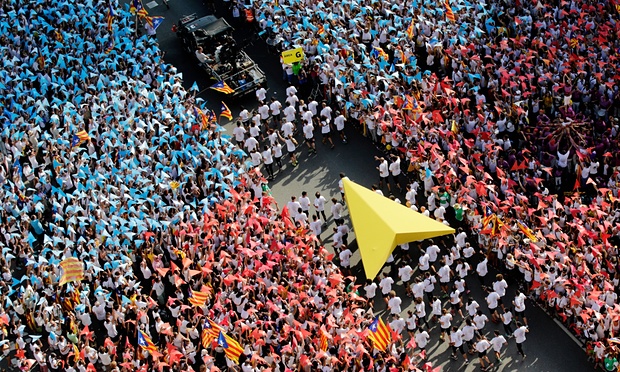
Catalans may point the way towards independence, but Madrid is set to block any binding vote on the matter.
Catalonia’s pro-independence parties got the result they wanted on Sunday’s regional election, winning an absolute majority that they say now gives them a “clear mandate” to press for independence from the rest of Spain.
But despite the bullish positivity eking out of the region, Madrid has held firm, saying that the separatists had “failed” in their mission because they were unable to secure an overall majority of votes, winning 72 of 135 seats to fall just short of 50% of the parliament…
Nevertheless, in winning 1.9 million of four million votes cast, Catalan regional President Artur Mas believes that the combined Junts per Si (Together for Yes) alliance, and the CUP far-left separatists, winning 62 and 10 seats respectively, can now proceed towards campaigning for an independent Catalan state.
“We have a clear, absolute majority in the Catalan parliament to go ahead,” Mas said. However, Madrid has confirmed that any unilateral moves made towards Catalan independence will be challenged in court.
In short, the result of the Catalan election has changed nothing in the eyes of the Spanish government, but pro-separatists are confident that a united Catalonia can have a disruptive impact on the general elections, which are due to be held in December. By piling more pressure on to the Popular Party (PP) government, Catalonia will ensure the issue of a Spanish breakup is at the forefront of debate – a debate that could cause further political fractures over the next few months.
Madrid will not sanction any binding referendum on Catalan independence, despite the result at the weekend all-but confirming that the bulk of Catalonia wishes to hold an independence referendum, even if a recent opinion poll revealed that only around half would want to break away from Spain should the matter arise.
Such a scenario, should it ever come to pass, is at least a few years away as Catalan authorities must first embark on the approval of their own constitution, the creation of a national defence, central bank and judicial system. Many additional uncertainties persist, too, such as the issue of Catalonia’s entry into the European Union (EU) and whether it would be permitted to adopt the euro.
For now, however, Catalonia has spoken, and Spain has responded. The debate may have reached another level this week, but there remains no concrete end in sight to one of the nation’s most enduring and divisive issues.
 en
en



 Vlaams-Nederlands
Vlaams-Nederlands
0 Comments
Leave a Comment
DISCLAIMER
The opinions and comments expressed by contributors to this Blog are theirs alone and do not necessarily reflect the views of VIVA Homes Under the Sun Ltd, any of its associated companies, or employees; nor is VIVA to be held responsible or accountable for the accuracy of any of the information supplied.
Have you got something to say?